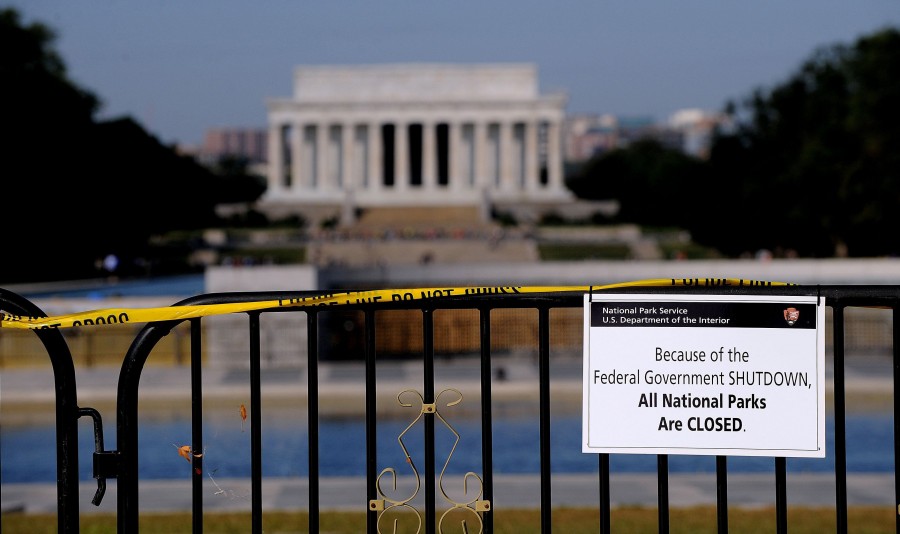On October 1 at 12:01am, the U.S. federal government unceremoniously shut down for the first time since 1995.
“The idea of putting the American people’s hard-earned progress at risk is the height of irresponsibility,” President Barack Obama said. “It does not have to happen.”
Without federal funding, over eight hundred thousand federal workers deemed nonessential by the government will be out of work and placed on furlough until a spending bill is passed and signed. The federal debt ceiling has also yet to be raised, and a failure to increase it by October 17 would cause the United States to default, making it the first time since 1789 that it would not have been able to pay off its debt.
A federal shutdown or default may have unprecedented consequences; the Dow Jones Industrial Average, for instance, fell by over 100 points, or nearly one percent , in the hours leading up to the shutdown. Its effects on the international economy are not immediately visible, but it may cause more damage than it did eighteen years ago, as government workers are unable to spend money that could have been pumped into the economy and tourism revenues are diminished by the closure of national monuments. Still yet, a default would carry dire effects on the world economy, as the U.S. dollar is the internationally established reserve currency; if the dollar were to be weakened by a default, various currencies around the world would lose value as well.
At the center of the controversy surrounding the spending bill was a measure added by Republicans in the House of Representatives to defund and delay the Affordable Care Act (ACA), or “Obamacare,” which was rejected by the predominantly Democratic Senate twice. The effort to defund the ACA, led by Sen. Ted Cruz (R-TX) and a group of Republicans, has been used as a bargaining chip for passing a resolution.
“I’m not going to negotiate… this is not about me and not about representatives in Congress,” Rep. John Boehner (R-OH) said during a hearing on the spending bill. “It is about fairness for the American people.”
Across the aisle, House Democrats argued against attaching the defunding of the ACA with the spending measure. They felt that it was too controversial to pass the Senate since the act had already passed Congress and the Supreme Court and was already at the will of the majority of American citizens.
“Let democracy work,” Rep. Steny Hoyer (D-MD) said following the Senate’s second rejection of the House of Representatives’ amendments. “Do not [dictate] to America that they will shut down the government. Let’s vote on it.”
Regardless of one’s political beliefs, it’s hard to argue for the idea of repealing a healthcare act, which passed by a narrow majority to begin with, by hijacking the United States budget, especially because the budget has a substantial impact on the operation of the federal government and is meant to be free of politically charged amendments.
“To make a political point about the power of Congress to shut down the government… doesn’t make us any safer as a nation; it certainly doesn’t enhance our image,” Sen. Dick Durbin (D-IL) said.
Moreover, the Affordable Care Act was passed by the system that has been trusted since the ratification of the Constitution; the American people elected men and women to represent them in Congress, and they voted to pass the act. The President of the United States, who was also elected, signed the bill into law. The Supreme Court upheld its legality.
If it is so important to repeal the Affordable Care Act because of the perceived danger it poses to the United States and its citizens, it is only fair to do so in a separate vote, rather than to hold the American people and the economy hostage to prove a point. The New York Times found that eight in ten Americans found it unacceptable to do so, rightfully so, given the ramifications of a federal shutdown.
“I shouldn’t have to offer anything,” President Obama said in an interview with NPR. “They’re not doing me a favor by paying for things they have already approved the government to do. That’s part of their basic function of government.”
Our legislature is supposed to look out for the wants and needs of us, the American people. A shutdown of the government is nothing short of complete disregard for that very goal, and given the consequences that the United States may face, it is absolutely imperative for Congress to pass spending measures and raise the debt ceiling now, before it becomes too late.
And so it’s 12:03am. Soldiers stationed overseas are not getting the paychecks they were promised. College students are unable to apply for loans. The Statue of Liberty will stand alone on Liberty Island as park rangers across the country lock up parks and landmarks to the public.
Eight hundred thousand people will apply for unemployment benefits because they’re out of a job because the people they voted for have failed them. Government officials have chosen to bicker about whose side is right instead of ensuring safety and welfare to the American people.
And that’s very wrong.


